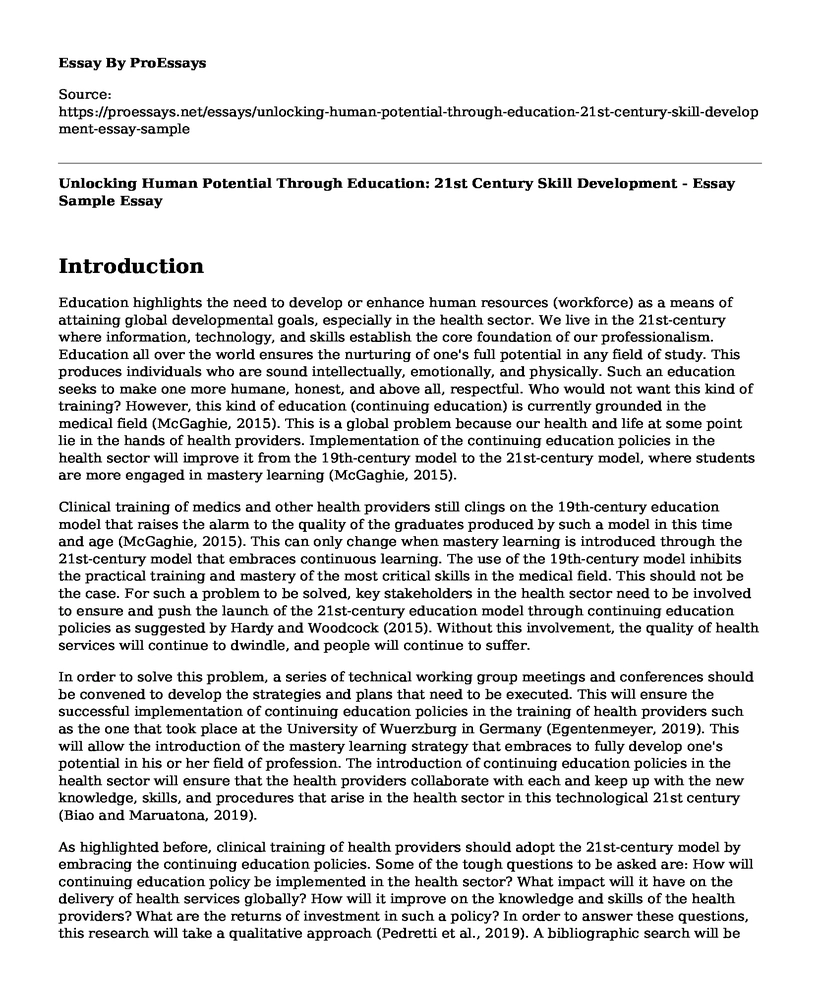Introduction
Education highlights the need to develop or enhance human resources (workforce) as a means of attaining global developmental goals, especially in the health sector. We live in the 21st-century where information, technology, and skills establish the core foundation of our professionalism. Education all over the world ensures the nurturing of one's full potential in any field of study. This produces individuals who are sound intellectually, emotionally, and physically. Such an education seeks to make one more humane, honest, and above all, respectful. Who would not want this kind of training? However, this kind of education (continuing education) is currently grounded in the medical field (McGaghie, 2015). This is a global problem because our health and life at some point lie in the hands of health providers. Implementation of the continuing education policies in the health sector will improve it from the 19th-century model to the 21st-century model, where students are more engaged in mastery learning (McGaghie, 2015).
Clinical training of medics and other health providers still clings on the 19th-century education model that raises the alarm to the quality of the graduates produced by such a model in this time and age (McGaghie, 2015). This can only change when mastery learning is introduced through the 21st-century model that embraces continuous learning. The use of the 19th-century model inhibits the practical training and mastery of the most critical skills in the medical field. This should not be the case. For such a problem to be solved, key stakeholders in the health sector need to be involved to ensure and push the launch of the 21st-century education model through continuing education policies as suggested by Hardy and Woodcock (2015). Without this involvement, the quality of health services will continue to dwindle, and people will continue to suffer.
In order to solve this problem, a series of technical working group meetings and conferences should be convened to develop the strategies and plans that need to be executed. This will ensure the successful implementation of continuing education policies in the training of health providers such as the one that took place at the University of Wuerzburg in Germany (Egentenmeyer, 2019). This will allow the introduction of the mastery learning strategy that embraces to fully develop one's potential in his or her field of profession. The introduction of continuing education policies in the health sector will ensure that the health providers collaborate with each and keep up with the new knowledge, skills, and procedures that arise in the health sector in this technological 21st century (Biao and Maruatona, 2019).
As highlighted before, clinical training of health providers should adopt the 21st-century model by embracing the continuing education policies. Some of the tough questions to be asked are: How will continuing education policy be implemented in the health sector? What impact will it have on the delivery of health services globally? How will it improve on the knowledge and skills of the health providers? What are the returns of investment in such a policy? In order to answer these questions, this research will take a qualitative approach (Pedretti et al., 2019). A bibliographic search will be done in Google Scholar databases, reliable medical websites, and medical journals. The inclusion criteria will only allow research studies conducted and published from 2010 to 2019. Approximately 30 to 50 records will be identified and analyzed to grant the above questions to be conclusively answered. I am qualified to perform this research because I am highly enthusiastic about this topic and would like to see a change in the health sector. If problems arise during the study, I am in the able hands of my supervisor, who will advise me accordingly until the end of the study. Some of the obstacles anticipated in this research might be the inadequacy of current research which I look forward to tackling head-on.
Conclusion
In conclusion, continuing education policies is vital in realizing the 21st-century education model in the health sector. Adaptation of this model in the clinical training of medics and other health providers will ensure that they are well equipped intellectually, physically, and emotionally. This will ensure high-quality health service provision and the achievement of global goals set in health. The results obtained from this research will be vital in showing how important it is to implement the continuing education policy in health.
References
Biao, I., & Maruatona, T. (2019). Mapping the field of adult and continuing education: an international compendium. Retrieved from https://www.researchgate.net/publication/332936866_Mapping_the_field_of_adult_and_continuing_education_an_international_compendium
Egetenmeyer, R. (2019). Adult Education, Professionalisation, and Lifelong Learning Policies. Retrieved from shttps://www.researchgate.net/publication/332954087_Adult_Education_Professionalisation_and_Lifelong_Learning_Policies
Hardy, I., & Woodcock, S. (2015). Continuing education policies: Discourses of difference, diversity, and deficit. International Journal of Inclusive Education, 19(2), 141-164. Retrieved from https://www.tandfonline.com/doi/abs/10.1080/13603116.2014.908965
McGaghie, W. C. (2015). Mastery learning: it is time for medical education to join the 21st century. Academic Medicine, 90(11), 1438-1441. Retrieved from https://www.ncbi.nlm.nih.gov/pubmed/26375269
Pedretti, A., Hilgemberg, T., Pedretti, A., Caporal, G. C., & Cardoso, V. D. (2019). Continuing education of physical education teachers in an inclusive educational context. European Journal of Special Education Research. Retrieved from https://oapub.org/edu/index.php/ejse/article/view/2297
Cite this page
Unlocking Human Potential Through Education: 21st Century Skill Development - Essay Sample. (2023, Feb 17). Retrieved from https://proessays.net/essays/unlocking-human-potential-through-education-21st-century-skill-development-essay-sample
If you are the original author of this essay and no longer wish to have it published on the ProEssays website, please click below to request its removal:
- Personal Statement for Admission
- Children's Online Privacy Protection Essay Example
- Cultural Awareness at American River College
- Racism in US Schools: An Increasing Issue - Essay Sample
- Free Paper Sample: Interest in Education Assistant Role
- Specializing in Psychology: Key to Successful Career - Essay Sample
- Columbia Southern University Policy - Essay Example







